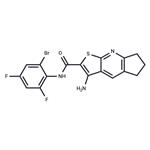dc_ac50 is a selective inhibitor of human copper-trafficking proteins atox1 and ccs with kd values of ~6.8 μm and ~8.2 μm [1].human copper-trafficking proteins atox1 and ccs are cytosolic copper chaperones that transfercopper to specific cellular destinations [1].dc_ac50 is a selective inhibitor of human copper-trafficking proteins atox1 and ccs. dc_ac50 is a self-fluorescing compound with excitations at 290 nm and 355 nm, and emission at 494 nm. in fret assay, dc_ac50 bound to atox1 and full-length ccs with kd values of ~6.8 μm and 8.2 μm. in fluorescence anisotropy (fa) assay, dc_ac50 bound to atox1, full-length ccs and ccs domain i with kd values of 6.4 μm, 7.9 μm and 12.2 μm. in human lung cancer h1299 cells, leukaemia cancer k562 cells, breast cancer mda-mb-231 cells and head and neck cancer 212ln cells, dc_ac50 dose-dependently inhibited cancer cell proliferation by targeting atox1 and ccs. dc_ac50 also induced reactive oxygen species (ros) accumulation, reduced cellular atp production and decreases lipid biosynthesis via amp-activated protein kinase (ampk) activation [1].in nude mice bearing lung cancer h1299 cells or leukaemia cancer k562 cells, dc_ac50 (100 mg/kg per day for 21 days) significantly decreased tumour size compared with vehicle control. in k562 mice model, dc_ac50 (10, 20 and 50 mg/kg per day) also induced a similar tumor-inhibition effects without any obvious toxicity or a change in body weight [1].
DC_AC50 is an inhibitor of copper trafficking proteins Atox1 and CCS, resulting in a disruption of cellular copper transport. Cancer cells rely more heavily on Atox1 and CCS than normal cells. DC_AC50 blockade of copper trafficking induces cellular oxidative stress, affecting cancer cells more strongly than normal cells, and leading to the inhibition of cancer cell proliferation.
[1]. wang j, luo c, shan cl, et al. inhibition of human copper trafficking by a small molecule significantly attenuates cancer cell proliferation. nature chemistry, 2015, published online 09 november 2015.
![3-amino-N-(2-bromo-4,6-difluorophenyl)-6,7-dihydro-5H-cyclopenta[b]thieno[3,2-e]pyridine-2-carboxamide Structure](/CAS/20200401/GIF/497061-48-0.gif)
